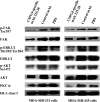CSPG4 protein as a new target for the antibody-based immunotherapy of triple-negative breast cancer
- PMID: 20852124
- PMCID: PMC2950168
- DOI: 10.1093/jnci/djq343
CSPG4 protein as a new target for the antibody-based immunotherapy of triple-negative breast cancer
Abstract
Background: The cell surface proteoglycan, chondroitin sulfate proteoglycan 4 (CSPG4), is a potential target for monoclonal antibody (mAb)-based immunotherapy for many types of cancer. The lack of effective therapy for triple-negative breast cancer (TNBC) prompted us to examine whether CSPG4 is expressed in TNBC and can be targeted with CSPG4-specific mAb.
Methods: CSPG4 protein expression was assessed in 44 primary TNBC lesions, in TNBC cell lines HS578T, MDA-MB-231, MDA-MB-435, and SUM149, and in tumor cells in pleural effusions from 12 metastatic breast cancer patients. The effect of CSPG4-specific mAb 225.28 on growth, adhesion, and migration of TNBC cells was tested in vitro. The ability of mAb 225.28 to induce regression of tumor metastases (n = 7 mice) and to inhibit spontaneous metastasis and tumor recurrence (n = 12 mice per group) was tested in breast cancer models in mice. The mechanisms responsible for the antitumor effect of mAb 225.28 were also investigated in the cell lines and in the mouse models. All statistical tests were two-sided.
Results: CSPG4 protein was preferentially expressed in 32 of the 44 (72.7%) primary TNBC lesions tested, in TNBC cell lines, and in tumor cells in pleural effusions from 12 metastatic breast cancer patients. CSPG4-specific mAb 225.28 statistically significantly inhibited growth, adhesion, and migration of TNBC cells in vitro. mAb 225.28 induced 73.1% regression of tumor metastasis in a TNBC cell-derived experimental lung metastasis model (mAb 225.28 vs control, mean area of metastatic nodules = 44590.8 vs 165950.8 μm(2); difference of mean = 121360.0 μm(2), 95% confidence interval = 91010.7 to 151709.4 μm(2); P < .001). Additionally, mAb 225.28 statistically significantly reduced spontaneous lung metastases and tumor recurrences in an orthotopic xenograft mouse model. The mechanisms responsible for antitumor effect included increased apoptosis and reduced mitotic activity in tumor cells, decreased blood vessel density in the tumor microenvironment, and reduced activation of signaling pathways involved in cell survival, proliferation and metastasis.
Conclusions: This study identified CSPG4 as a new target for TNBC. The antitumor activity of CSPG4-specific mAb was mediated by multiple mechanisms, including the inhibition of signaling pathways crucial for TNBC cell survival, proliferation, and metastasis.
Figures






References
-
- van ‘t Veer LJ, Dai H, van de Vijver MJ, et al. Gene expression profiling predicts clinical outcome of breast cancer. Nature. 2002;415:530–536. - PubMed
-
- Perou CM, Sorlie T, Eisen MB, et al. Molecular portraits of human breast tumours. Nature. 2000;406:747–752. - PubMed
-
- Rakha EA, El-Sayed ME, Green AR, et al. Biologic and clinical characteristics of breast cancer with single hormone receptor positive phenotype. J Clin Oncol. 2007;25:4772–4778. - PubMed
Publication types
MeSH terms
Substances
Grants and funding
LinkOut - more resources
Full Text Sources
Other Literature Sources
Medical
Miscellaneous

